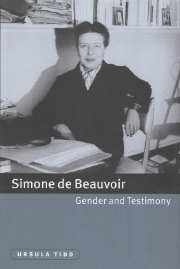Book contents
- Frontmatter
- Contents
- Acknowledgements
- List of abbreviations
- Introduction
- PART I BECOMING THE SELF
- PART II WRITING THE LIFE
- 3 Narratives of self-representation
- 4 Negotiating autobiography
- 5 Writing the self – Mémoires d'une jeune fille rangée
- 6 Bearing Witness with the Other, bearing witness for the Other
- 7 Writing the Other
- Epilogue
- Notes
- Bibliography
- Filmography
- Index
- CAMBRIDGE STUDIES IN FRENCH
6 - Bearing Witness with the Other, bearing witness for the Other
Published online by Cambridge University Press: 22 September 2009
- Frontmatter
- Contents
- Acknowledgements
- List of abbreviations
- Introduction
- PART I BECOMING THE SELF
- PART II WRITING THE LIFE
- 3 Narratives of self-representation
- 4 Negotiating autobiography
- 5 Writing the self – Mémoires d'une jeune fille rangée
- 6 Bearing Witness with the Other, bearing witness for the Other
- 7 Writing the Other
- Epilogue
- Notes
- Bibliography
- Filmography
- Index
- CAMBRIDGE STUDIES IN FRENCH
Summary
In the previous chapter, it was argued that in Mémoires d'une jeune fille rangée Beauvoir constructs a narrative self in opposition to the patriarchal bourgeoisie of the 1950s and of her childhood, primarily through her attachment to Zaza. However, Zaza is sacrificed to the heterosexual recuperation and path to intellectual development constituted by the apocalyptic meeting with Sartre. In the Mémoires, a transition therefore exists from the narrative representation of a solipsistic ‘je’ who, although disciplined by the bourgeoisie, relates herself to herself (for the reader is envisaged as a benevolent other self), to the representation of a self who is formed in opposition to her class and constructed as a ‘being-with-the Other’ or ‘Mitsein’.
This construction of the past self as a ‘being-with-the Other’ is initially represented in the Mémoires as the female couple of Simone and Zaza, followed by the heterosexual couple of Simone and Jean-Paul Sartre. Both these couples are represented as standing in different degrees of opposition to the bourgeoisie. Beauvoir constructs her autobiographical representation of selfhood, then, through two different relations to the Other: reciprocity (with Zaza and Sartre) and conflict (in opposition to the bourgeoisie).
Beauvoir had already examined these two forms of alterity in Pour une morale de l'ambiguïté and Le Deuxième Sexe. In La Force de l'âge and La Force des choses, this ‘being-with-the-Other’ also assumes a historical and ethical significance, for it comes to involve bearing witness for the Other.
- Type
- Chapter
- Information
- Simone de Beauvoir, Gender and Testimony , pp. 130 - 154Publisher: Cambridge University PressPrint publication year: 1999



